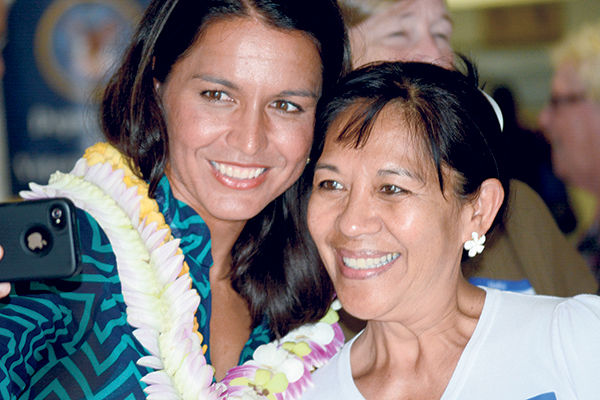When Gen. Lori J. Robinson assumed top command of the Air Force in the Pacific on Thursday, she became the first woman to lead an Air Force major component command.
It was exhilarating to watch the ceremony, said Rep. Tulsi Gabbard, D-Hawaii.
“I got a little bit of chicken skin as I saw her standing there, getting her first salute from her commanders, her leaders, and the airman that were there, understanding the impact of that moment,” she said.
That moment saw a person Gabbard described as a highly capable, experienced, strong leader take over a post traditionally held by men. It’s well past the time for a woman to have the opportunity to take charge in the military, she said.
“There’s no better job than to be in a position to be a leader of troops,” she said to about 75 men and women who attended the inaugural Women Veterans Conference on Saturday at the Kauai Veterans Center.
In a 20-minute talk, Gabbard said women have and will continue to overcome challenges and obstacles as they do “incredible things” during their military careers. Robinson’s career move will open more doors for other women to take on leadership roles. The wall that has kept military leadership to men only is slowly coming down, she added.
“To finally be in a position to have women leading at some of the highest levels of our military will help to change some of the culture that has existed and created some of the obstacles we’ve seen,” she said.
Gabbard, whose military career began in 2003 when she joined the Hawaii Army National Guard and included two deployments in the Middle East, is today one of only two female combat veterans in the U.S. Congress.
“Which is appalling, when you look at how many women have served,” she said.
While she said the military culture is changing for the better, there remains a lack of information and what she called “innocent ignorance.”
She recounted a story of leading a platoon of military police soldiers headed to the Middle East. The platoon trained at Fort Hood, Texas, to handle convoy security into Iraq. It was a group with diverse skills, ready to handle enforcement, patrol or detainment.
They were eager and ready for the task. But Gabbard was informed her platoon would not be given the task because a battalion commander said he didn’t want any women on the mission.
“For me, it’s mind-boggling. As a military, we train professionals. We were disqualified from this mission because people didn’t understand our professionalism and how we handle our business,” she said.
Gabbard still sees bias against women in Congress when it comes to the military due to a lack of understanding. Some congressmen have said they would never vote to send a woman into harm’s way. But women and men, she said, are already side by side in the field of battle.
“It’s already happened and we’ve done very well,” she said.
Women are not looking for a lowering of military standards, Gabbard said.
“We are looking simply for an opportunity for women who have the desire and the passion and the motivation to step up to the plate,” she said.
Cecelia Gomez, who served in the Army from 1978 to 1982 and attended Saturday’s conference, said she was pleased to learn women are earning military promotions and more doors are opening for them to be in command. She was also glad to hear of the benefits available to veterans.
“It’s great to see all of this is coming together,” she said.
Gabbard praised those who attended the veterans conference.
“The fact that you’re here shows you’re continuing your mission of service even if you’re no longer wearing the uniform. To me that is the greatest asset and contribution that veterans are bringing to our country everywhere,” she said.
She said a strong network of veterans is an effective way to create change in the military command structure.
“That voice must come from her servicemembers and our veterans, but the political pressure must come from our communities,” she said.




